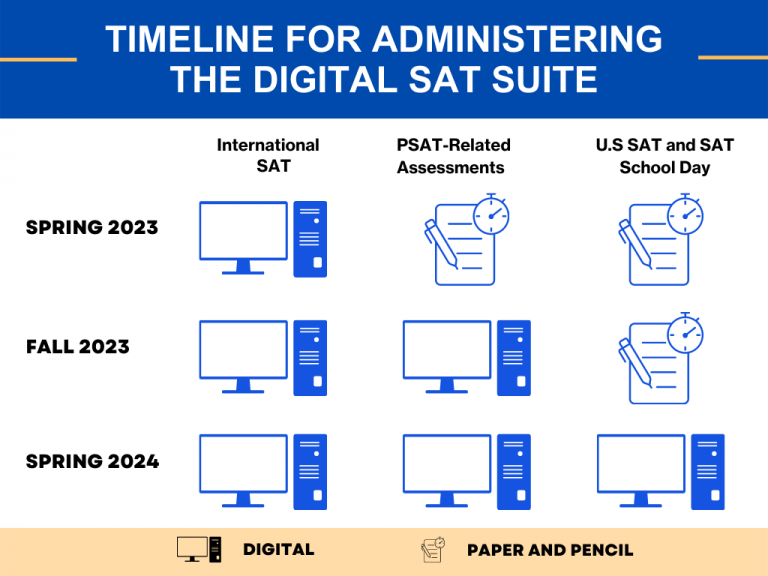The New Digital SAT® [UPDATE]

Over the next 4-6 months, more data and materials will be made accessible concerning the digital SAT®, and we will assist in educating parents and counselors about what it all means.
THE SHORT VERSION:
The SAT® and ACT’s current dovetailing is about to diverge.
The SAT®’s strategy is to adapt to the times; the ACT’s strategy is to maintain the status quo. Both argue how students benefit from the paths they are each paving.
The new terrain appears to have undergone more change than any test preparation sector has seen in the past. Ensuring that the market’s demands are met will require more resources, institutional experience, technological expertise, and specialization than ever before. Our organization feels invigorated about the opportunities this creates, and TA will assist students in acclimating to the new format.
Nearly all 2024 graduates will complete their testing before the introduction of the digital SAT®. For the class of 2025, it becomes more complicated. Families and counselors should be aware of the following..
Do you want to improve your chances of getting into a top-tier university? Schedule your consultation with Tokyo Academics today!

Differences Between the New Digital SAT® and Paper Tests




THE DIGITAL ADAPTIVE SAT® DETAILS:
Rollout
- Test specifications should be available as soon as early July at the latest. The specifications will include sample items but little in the way of practice material.
- Four practice exams should be available on the College Board’s testing app this fall.
- Khan Academy will also release its initial practice exercises in the fall.
- Colleges, high schools, and students will not have to learn a new scoring system. No concordance is required; College Board will continue to score exams between 200 and 800. A score of 620 on a paper test should correspond to a score of 620 on the digital SAT®.
Will colleges superscore paper and digital? Advanced Juniors will be able to take the paper exam in the fall of 2023 and the digital version of the exam again in the spring of 2024. The former will be more beneficial if it can be superscored with the latter. Since consensus is not required, College Board will endorse superscoring and individual colleges will make the final call.
Administration
- National holidays will not change at this time.
- School day testing will enjoy even greater flexibility: broad testing windows, staggering students throughout the day or across a week or month, and easy make-ups for absences. However, there will be limits to re-testing within a window.
- In the future, national testing might provide even more flexibility, such as varying start times during the day.
- How fees might change is still unknown.
Accommodations
- Existing accommodations will be honored, and the majority will be offered in digital, adapted formats.
- Students with extra time are not permitted to finish a segment early to move on.
- For accommodations that cannot be given digitally (e.g., Braille), students will take the longer, 3-hour, non-digital, and non-adaptive exam..
The Fundamentals of Stage Adaptive
- The adaptive nature of the exam is critical to making it a much shorter test.
- According to College Board, the digital SAT® will also differ in pace from the current test.
- There will be a pause (not a break) between each of the two stages (or modules) that make up each Section. Every stage will last roughly 30 to 35 minutes. At the end of the first section, there will be a pause (two stages). The test’s structure (example: Does Math usually come first or second?) is still to be determined.
- The first stage of each section is not adaptive (item difficulty will not “adapt” to a student’s performance). The adaptation occurs in the second stage.
- The first stage of the test will determine the difficulty level of the second stage.
- The better a student performs on the first level, the more difficult the second level will be. The shift in difficulty between levels one and two is critical for accurately scoring the shorter test.
- The SAT® will not use item-adaptive, where each question changes depending on performance (like the GMAT). It will only adapt to the stage (like the GRE). It will adjust once for math and once for reading and writing. This allows the student to move backward and forward within a stage while simultaneously lowering the stakes on any one question.
The Details of Stage Adaptation
- Item Response Theory is the scoring method used for adaptive tests. Questions may be weighted differently under IRT and based on the score level. The digital test will better understand a question’s ability to distinguish between different skill levels, and the question will be valued accordingly. IRT can generate a more refined and accurate explanation concerning the issues and weightings that places a student into a specific score range.
- An adaptive test cannot have a simplistic right/wrong tally, so students will never know how many questions they answered correctly or incorrectly. Students will not be able to pinpoint how their grade was calculated. A published scale is meaningless when each person has taken a distinct exam.
- Students won’t have access to their problems as College Board will reuse some of the questions. Additional sample tests will be released regularly in place of QAS releases.
Test technology and security
- Even at the beginning of the test, students taking it together will experience different test versions. The exam uses a variety of problems, but the newly developed question sets will adhere to the same content criteria and offer a comparable testing environment.
- There are no longer any locked drawers, sealed booklets, or delayed postal items, which considerably reduces the possibility of a test being compromised.
- Since there is a low chance of sharing issues within a room or during breaks, students at the same testing location can begin at different times.
- Students may bring their own laptop or tablet or use the technology the school or facility provides. For added convenience, they can also include external gadgets like a mouse, keyboard, or pen. College Board will establish a lending program for students without approved electronics.
- Students will not be able to open other apps while taking the test because the test will be administered in a locked-down app.
- Students must show up with fully charged devices with the testing software installed. Exam facilities *may* supply power to test takers with regular time limits and *must* supply it to those with extended time limits.
- There will be scratch paper available because the app will not permit the marking up of arithmetic diagrams. You may use a pen or pencil.
- Minimum bandwidth requirements apply. Because the entire test is cached and encrypted, it should not be affected by an internet outage. The exam results can be submitted even after the examination has concluded. It is challenging to enforce the proctor’s “pencils down” instruction during a paper test. But the digital exam can be effortlessly ended by the computer while the results are kept confidential.
- If a power outage interrupts the test, it may be restarted with proctor approval. Powering off and on again on purpose is cheating and is strictly prohibited. The College Board has a full transcript of what happened, making it unlikely for cheating strategies that take advantage of the digital form to succeed.
- The issue of proctors timing students incorrectly or not providing notifications should not be an issue because each student will have their own timer in the app.
- The fact that pupils finish at various times could cause interruptions, yet College Board insists that its pilot testing has gone without a hitch.
REACTIONS TO THE ACT AND UPDATE:
- Since the new digital SAT® will be the third distinct SAT® administered in just the previous eight years, ACT wants to maintain its reputation as a trustworthy option.
- We can end the rumors about the Science section being removed.
- The optional Writing section will be available to students testing internationally and to comply with state contracts.
- Section Retesting is currently not an option.
- ACT is working on slowing down the test’s pace.
- Even if a digital option is one day made available to all students at national sites, paper tests will still be an option. They are working through practical issues with their site partners and considering digital testing at national sites.
- They already provide a computerized version of the paper exam for use in specific domestic and foreign administrations.
- ACT has not ruled out adaptive scoring for a revised digital exam.
- The lack of test sites, particularly in areas like California, is a well-known issue without a clear strategic solution. It is not an issue in areas where ACT has a considerable presence with state and district testing. They do not have a strategy for persuading schools to return to national testing. While ACT and College Board are both having success with testing during the school day, an unexpected consequence is that there is less of an incentive for those schools to take part in national testing.
If any of this changes once the College Board releases the test specifications, we will update this page.
SAT® is a trademark owned by the College Board, which is not affiliated with, and does not endorse Tokyo Academics.
Looking for More International School Guidance?
Visit our Resource Center and gain access to recorded webinars, podcast episodes, school profiles, and more.
Academic Services
Admissions
Additional Services
Community
Contact
Call us
Email us
Visit us
Tokyo Academics
Nishiazabu 3-24-17,
Hirose Building 3F,
(above FamilyMart)
Minato, Tokyo 106-0031
Tokyo Academics
Futako Tamagawa
Tamagawa 1-9-3
LIBERLA Futako B1F
158-0094
Tokyo Academics
© Copyright 2025 Tokyo Academics | All Rights Reserved | Terms of Use | Privacy Policy
Contact
Call us
Email us
Visit us
Tokyo Academics
Nishiazabu 3-24-17,
Hirose Building 3F,
(above FamilyMart)
Minato, Tokyo 106-0031
Tokyo Academics
Futako Tamagawa
Tamagawa 1-9-3
LIBERLA Futako B1F
158-0094
Tokyo Academics
